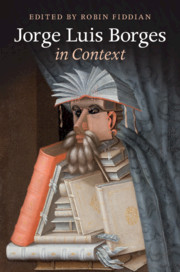Book contents
- Jorge Luis Borges in Context
- Jorge Luis Borges in Context
- Copyright page
- Contents
- Illustrations
- Contributors
- Acknowledgements
- Permissions
- Note on Primary Sources and Editions Used
- Chronology
- Note on Translations and Abbreviations
- Introduction Borges in Context, Context in Borges
- Part I Self, Family, and the Argentine Nation
- Part II The Western Canon, the East, Contexts of Reception
- Chapter 17 Borges and Cervantes
- Chapter 18 Borges’s Shakespeare
- Chapter 19 Borges and the Dialectics of Idealism
- Chapter 20 The English Romantics and Borges
- Chapter 21 Borges and the First Spanish Avant-Garde
- Chapter 22 Borges and James Joyce: Makers of Labyrinths
- Chapter 23 Borges and Kafka
- Chapter 24 Borges and the Bible
- Chapter 25 Borges and Judaism
- Chapter 26 Borges and Buddhism
- Chapter 27 Borges and Persian Literature
- Chapter 28 Borges and the ‘Boom’
- Chapter 29 Argentina and Cuba: The Politics of Reception
- Chapter 30 Borges and Coetzee
- Chapter 31 Borges in Portugal
- Chapter 32 Borges and Italy
- Further Reading
- Index
Chapter 19 - Borges and the Dialectics of Idealism
from Part II - The Western Canon, the East, Contexts of Reception
Published online by Cambridge University Press: 16 January 2020
- Jorge Luis Borges in Context
- Jorge Luis Borges in Context
- Copyright page
- Contents
- Illustrations
- Contributors
- Acknowledgements
- Permissions
- Note on Primary Sources and Editions Used
- Chronology
- Note on Translations and Abbreviations
- Introduction Borges in Context, Context in Borges
- Part I Self, Family, and the Argentine Nation
- Part II The Western Canon, the East, Contexts of Reception
- Chapter 17 Borges and Cervantes
- Chapter 18 Borges’s Shakespeare
- Chapter 19 Borges and the Dialectics of Idealism
- Chapter 20 The English Romantics and Borges
- Chapter 21 Borges and the First Spanish Avant-Garde
- Chapter 22 Borges and James Joyce: Makers of Labyrinths
- Chapter 23 Borges and Kafka
- Chapter 24 Borges and the Bible
- Chapter 25 Borges and Judaism
- Chapter 26 Borges and Buddhism
- Chapter 27 Borges and Persian Literature
- Chapter 28 Borges and the ‘Boom’
- Chapter 29 Argentina and Cuba: The Politics of Reception
- Chapter 30 Borges and Coetzee
- Chapter 31 Borges in Portugal
- Chapter 32 Borges and Italy
- Further Reading
- Index
Summary
In dialogue with the British empiricist tradition of Berkeley and Hume, Borges engages in an illuminating critique of their idealism, in the early essays ’Berkeley’s Crossroads’ and ’The Nothingness of Personality’ and especially in ’Tlon, Uqbar, Orbis Tertius’. This chapter juxtaposes ’Tlon...’ with passages from ’A Treatise on Human Nature’, observing that in Hume a sceptical outlook hardly ever gives way to gloomy melancholy; indeed, it is balanced by humour and moderation. In ’A New Refutation of Time’, Borges carries Berkeleyan immaterialism to its ultimate consequences, using the arguments of idealism to deny temporal series. This portrayal of time highlights human life rooted in contradiction, reflected in the very Borgesian qualities of paradox and irony.
- Type
- Chapter
- Information
- Jorge Luis Borges in Context , pp. 158 - 165Publisher: Cambridge University PressPrint publication year: 2020

